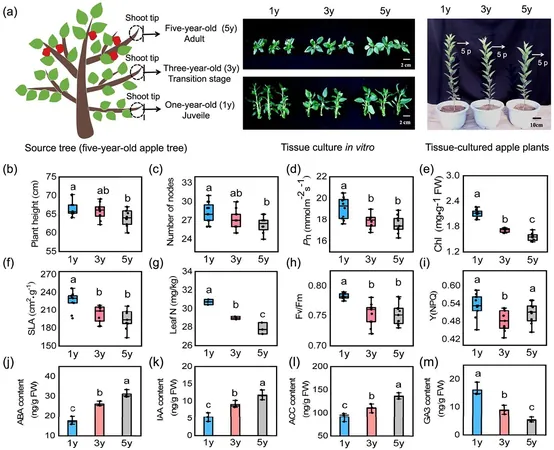
Unlocking Growth: How Sorbitol Is Revolutionizing Apple Tree Development
2024-11-12
Author: Siti
Unlocking Growth: How Sorbitol Is Revolutionizing Apple Tree Development
Apple trees, like many perennial plants, face an extended juvenile phase before achieving full maturity. This period is characterized by intricate developmental transitions that profoundly affect photosynthesis, growth rates, and hormonal balance. Yet, the precise mechanisms behind these critical changes remain elusive, complicating efforts to enhance productivity in apple orchards—a vital economic sector.
To improve the growth strategies and yield of apple trees, researchers are digging deep into the genetic and physiological interactions that steer these developmental changes. A groundbreaking study from the State Key Laboratory for Crop Stress Resistance at Northwest A&F University, recently published in Horticulture Research, delves into the fascinating role of sorbitol in apple plant growth transitions.
The researchers found that as apple plants age, the accumulation of sorbitol triggers a significant transition from rapid to slower growth, revealing crucial genetic mechanisms at play. By utilizing tissue-cultured apple plants representing adolescent, transitional, and mature stages, they meticulously measured variations in plant height, photosynthetic efficiency, hormone levels, and carbon metabolism.
One of the standout findings of the study was the discovery of the gene MdSDH1, which is essential for sorbitol breakdown. This gene is especially active during the juvenile phase of the apple tree's growth. When researchers suppressed MdSDH1, there was a notable decrease in gibberellin (GA3) levels—as well as plant growth. However, when exogenous GA3 was introduced, it successfully restored these growth traits, showcasing the gene's pivotal role in regulating growth.
Furthermore, accumulated sorbitol activates the MdSPL1-MdWRKY24 module, which works to suppress genes associated with growth and enforce a slow-growth strategy. This groundbreaking research thus illuminates sorbitol's dual purpose as both a carbon source and a signaling molecule, fundamentally enriching our understanding of the developmental processes in apple trees.
Dr. Fengwang Ma, senior author of the study, highlighted the significance of their findings: “Our research uncovers how sorbitol and genetic regulators work together to govern apple plant growth. By understanding these intricate mechanisms, we can better manage growth phases and boost agricultural productivity." He also emphasized the broader implications that understanding these growth dynamics could have on breeding programs, allowing for the creation of apple varieties that exhibit improved growth traits and resilience against environmental stresses.
The exciting revelations from this research promise to reshape apple cultivation practices significantly. By strategically managing sorbitol levels and the associated genetic factors, apple breeders can optimize growth rates and fruit yields, effectively addressing the challenges posed by climate change and resource limitations.
This comprehensive study lays a robust foundation for enhanced fruit production and sustainability efforts in the apple industry, ushering in a new era of agricultural innovation. As the scientific community continues to explore these tantalizing connections between metabolics and genetics, we can expect groundbreaking advancements in how we grow and manage apple trees, ensuring a fruitful future for this beloved fruit.



 Brasil (PT)
Brasil (PT)
 Canada (EN)
Canada (EN)
 Chile (ES)
Chile (ES)
 España (ES)
España (ES)
 France (FR)
France (FR)
 Hong Kong (EN)
Hong Kong (EN)
 Italia (IT)
Italia (IT)
 日本 (JA)
日本 (JA)
 Magyarország (HU)
Magyarország (HU)
 Norge (NO)
Norge (NO)
 Polska (PL)
Polska (PL)
 Schweiz (DE)
Schweiz (DE)
 Singapore (EN)
Singapore (EN)
 Sverige (SV)
Sverige (SV)
 Suomi (FI)
Suomi (FI)
 Türkiye (TR)
Türkiye (TR)